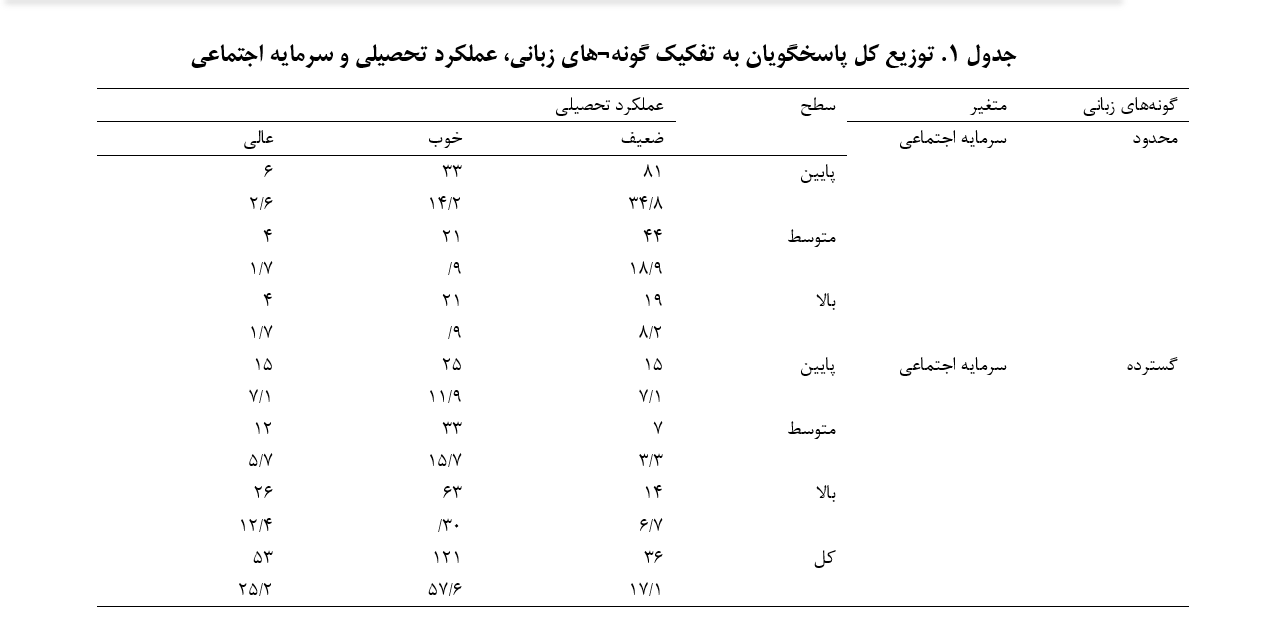The Role of Social Capital in the Formation of Restricted and Elaborated Language Codes and Its Relationship with Academic Performance of Payame Noor University Students
Keywords:
Social capital, academic performance, restricted and elaborated language codes, family backgroundAbstract
Social capital plays a more significant role today compared to other forms of capital, such as physical and human capital, in societies. Among the scholars emphasizing the importance of social capital, James Coleman assigns a critical role to family and educational systems as sources that generate social capital alongside other sources. This study, based on James Coleman’s theoretical framework, investigates the relationship between the social capital within families, the formation of restricted and elaborated language codes, and their connection to academic performance among students enrolled at Payame Noor University. The research employed a survey method, with data collected through questionnaires accompanied by interviews. The statistical population consisted of all male and female students studying at Payame Noor universities in East Azerbaijan Province. A sample size of 452 was determined using simple random sampling and Fadi’s proposed formula. The reliability of the research scales was assessed using the internal consistency method and Cronbach’s alpha coefficient, while their validity was measured using the construct validity method. To analyze the research data, two-way analysis of variance (ANOVA) tests were employed. The findings revealed that students with moderate or higher levels of family social capital and elaborated language codes demonstrated better academic performance compared to students with restricted language codes.
Downloads
References
Sharepour M. Dimensions and Functions of Social Capital and the Consequences of Its Erosion. Tehran: Payam Noor University Publications; 2021.
Putnam R. The Prosperous Community: Social Capital and Public Life. American Prospect. 2009:35-42.
Wibowo A. The Importance of Social Capital in Developing Students' Literacy Skills in Elementary Schools. Indonesian Journal of Educational Research and Review. 2024;7(1):116-27. doi: 10.23887/ijerr.v7i1.68144.
Coleman J. Social Capital in the Creation of Human Capital. American Journal. 1988. doi: 10.1086/228943.
Coleman J. Foundations of Social Theory. Tehran: Nia Publications; 2017.
Feng J. The Mediating Effect of Psychological Resilience Between Individual Social Capital and Mental Health in the Post-Pandemic Era: A Cross-Sectional Survey Over 300 Family Caregivers of Kindergarten Children in Mainland China. Social Sciences. 2024;13(2):122. doi: 10.3390/socsci13020122.
Xu H, Zhang C, Huang Y. Social trust, social capital, and subjective well-being of rural residents: Micro-empirical evidence based on the Chinese General Social Survey (CGSS). Humanities and Social Sciences Communications. 2023;10(1):1-13. doi: 10.1057/s41599-023-01532-1.
Sharepour M. Sociology of Education. Tehran: Samt Publications; 2020.
Tavassoli GA. An Analysis of Pierre Bourdieu's Thought on the Social Conflict Space and the Role of Sociology. Social Sciences Journal. 2004(22).
Abdollahi M, Mousavi MT. Social Capital in Iran: Current Situation, Future Prospects, and the Feasibility of Transition. Social Welfare Quarterly. 2007;6(25).
Nategh Poor MJ. Formation of Social Capital and Meta-Analysis of Its Influential Factors. Social Sciences Journal. 2005(28).
Jenkins R. Pierre Bourdieu. Tehran: Nia Publications; 2019.
Tavassoli GA, Mousavi M. The Concept of Capital in Classical and New Theories, with Emphasis on Social Capital Theory. Social Sciences Journal. 2005(26).
Frisby D. Georg Simmel. Tehran: Ghoghnous Publications; 2016.
Veblen T. Theory of the Leisure Class. Tehran: Nia Publications; 2022.
Putnam R. Democracy and Civil Traditions. Tehran: Ministry of Interior Publications; 2020.
Fukuyama F. The End of Order: Social Capital and Its Preservation. Tehran: Iranian Society Publications; 2022.
Fukuyama F. Social Capital and Civil Society. Tehran: Shirazeh Publications; 2005.
Jahangiri N, Afkhami A, Koochakzadeh F. Vocabulary and Structural Development of Primary School Students' Writing Based on Social Class Variables within Basil Bernstein's Theory. Foreign Languages Research. 2007(39):21-37.
Shahi F. The Impact of Video Games on the Reading Skills of Primary School Girls in Shahin Shahr: Payam Noor University, Isfahan; 2010.
Doostizadeh MR. The Importance of Cultural Transmission in Acquiring Language Skills. Foreign Languages Research. 2008(46).
Mikolic V. Culture and language awareness in the multicultural environment of Slovene Istria. Journal of Pragmatics. 2010;42:637-49. doi: 10.1016/j.pragma.2009.07.012.
Kavandi H, Parsa A, Shahi S. Culture and Its Role in Creating Restricted and Extensive Language Forms and Academic Success of 4th Grade Primary School Students in Ahvaz. Curriculum Studies Quarterly. 2012;7(26):105-26.
Bernstein B. Class, Codes, and Control. London and Boston: Routledge and Kegan Paul; 1975.
Sadovnik AR. Basil Bernstein. Paris UNESCO: International Bureau of Education. 2010;XXXI(4):687-703.
Colling NE. An Encyclopedia of Language. London and New York: Routledge; 2018.
Arefi M. Investigation of Linguistic-Cognitive Skills of Bilingual Children with Different Economic-Cultural Backgrounds. Educational Innovations Quarterly. 2003;2:57-68.
Parsa M. Psychological Concepts. Tehran: Baatest Publications; 2018.
Farahani A. Entry Behavior and Its Relationship with the Academic Performance of Physical Education Students. Movement Quarterly. 2002(15).
Farahani A, Farddanesh H. Comparing the Academic Performance of Physical Education Students in the Distance and In-Person Education Systems. Higher Education Research and Planning Quarterly. 2001(21-22).
Giddens A. Living in a Post-Traditional Society. In: Reflexive M, editor.: Beek, Giddens, and Lash; 2016.
Ghasemi V, Esmaili R, Rabei K. Social Capital Ranking in the Districts of Esfahan Province. Social Welfare Quarterly. 2006;6(23).
Dortaj F, Poor Nematollah M. Evaluation of Academic Performance of Students with Special Quotas and Regular Students. Higher Education Research and Planning Quarterly. 2008(19).
Field J. Social Capital. Tehran: Institute of Social Security Research Publications; 2012.
Putnam R. Bowling Alone: The Collapse and Revival of American Community. New York: Simon & Schuster; 2000.
Vandenberghe F. "The Real is Relational": An Epistemological Analysis of Pierre Bourdieu's Generative Structuralism. Sociological Theory. 1999;17(1):32-67. doi: 10.1177/073527519901700103.

Downloads
Published
Submitted
Revised
Accepted
Issue
Section
License
Copyright (c) 2025 Journal of Study and Innovation in Education and Development

This work is licensed under a Creative Commons Attribution-NonCommercial 4.0 International License.










